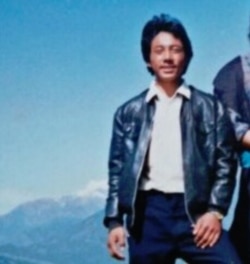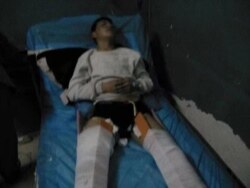Eight years after he was jailed for sharing news about protests in Tibet, Kunchok Jinpa died in a Lhasa hospital.
Jinpa, who in 2013 was sentenced to 21 years in prison for “leaking state secrets,” had been transferred to a hospital without his family’s knowledge. The 51-year-old suffered a brain hemorrhage and was paralyzed, rights groups said.
His experience sheds light on the dangers for Tibetans who share news about the region with outside sources.
Governed by China as an autonomous region, Tibet is one of the least-free territories in the world, with Tibetans risking arrest for petitioning authorities, sharing images about the Dalai Lama on social media, or exposing corruption by local officials, according to the U.S.-based rights group Freedom House.
News outlets are controlled by China, and foreign journalists are allowed access to the region only on official media tours, meaning that Tibetans wanting access to independent news have to circumvent the Great Firewall—internet restrictions and regulations imposed by Beijing.
Regional authorities also are cracking down on the use of virtual private networks (VPNs) and popular messaging platforms such as WeChat that many in the region use to communicate.
In November, cyber police issued more regulations on online activity, including bans on using VPNs to access foreign websites, joining discussion groups, or using apps and devices to share or access information that promotes secession or undermines “national unity.”
High-risk connections
One journalist, who asked to be identified only as Kelsang to protect his sources inside Tibet, told VOA he uses a VPN when he needs to contact people via WeChat.
Kelsang follows Chinese government WeChat pages to collect information on policies, and accesses websites and live stream apps such as Kuaishou so he can meet people from different places in Tibet and China and get a clearer understanding of the situation on the ground.
“I don’t mention my profession and try to collect information through casual chats,” he told VOA.
Though he keeps his sources anonymous, Kelsang said he learned that one contact, who ran an online platform focusing on environmental and development issues, was detained for six months and had his WeChat platform permanently blocked.
Kelsang said the police recently searched the phones of two other online contacts and accused them of communicating with “separatist people from outside”.
“After this incident, one of them blocked me,” he said.
The journalist said he has dropped news stories on sensitive issues to protect sources.
When India and China clashed in 2020 over borders in the Galwan valley – a disputed Himalayan border region – Kelsang received information suggesting a large number of Tibetans were forced to join military training, in preparation for a possible war.
“The family members of my source receive some financial aid from the Chinese government and they could suffer consequences if I filed the story,” he said.
Ultimately, Kelsang said he decided not to publish—a decision the outlet he works for makes on a case-by-case basis.
Authorities in the region can put pressure on activists by denying them access to basic amenities or an education for their children, said Pema Gyal, a researcher at the Tibetan Center for Human Rights and Democracy.
The India-based nongovernmental human rights organization, which investigates and reports on human rights issues in Tibet, is aware of at least 20 Tibetans in exile who have cut off contact with family members to try to protect them from retaliation, Gyal said.
Tashi Dhondup, a Tibetan living in exile in Dharamsala, India, cut direct contact with his family after authorities arrested the mother of his child in 2013 for keeping a photo of Dhondup with the Dalai Lama on her WeChat account.
Dhondup told VOA he has been wary of sharing details of other instances of retaliation against his family in case it led to further scrutiny or charges against them.
Last August, Dhondup’s younger sister, Lhamo, died shortly after being sent to a hospital from police custody. She was 36.
“I heard about her death from a cousin in the West. I was heartbroken when I came to know the cause of her death,” Dhondup said.
Lhamo had been accused of associating with a cousin accused of sending money to India. When police searched her home, they confiscated DVDs of religious teaching by the Dalai Lama and pictures of the Dalai Lama, Dhondup said.
Pressure points
Other journalists say they watch for signs that contacts may be under pressure.
“I use WeChat and other Chinese microblogs to get in touch with my sources and try my best to protect their identities by distorting their audios,” said Gyaltsen Choedak, who reports on news inside Tibet for VOA.
“Lately I’ve noticed that my sources have become less open and don’t respond to queries. Many have stopped responding and some have blocked me," he said.
One of them left a message saying, “Weather here is not so good … It may get better after March.” Choedak said he took that to be a reference to increased restrictions in March, which marks the anniversary of the 1959 Tibetan National Uprising against China.
Gyal said that Article 35 of China’s constitution guarantees “freedom of speech, of the press, [and] of assembly” but local authorities say they will “strike hard” against online activities deemed to split the country or undermine national unity.
Authorities already have used new powers granted in November to crack down on online activity.
On February 17, three teenagers were arrested, one of whom, identified by a rights group as Dadul, was later hospitalized with broken legs. No official reason was provided for their arrest, but the Britain-based Free Tibet group says they believe it was for failing to register a WeChat group with local authorities, which is a violation of the new regulations.
For those reporting on Tibet from the outside, silence often is the main indicator that something is wrong.
In the last message that Jinpa posted to his WeChat account in 2013, he wrote: “Even if they arrest me, I am not afraid, even if they kill me, I have no regrets. But from now on, I will not be able to give reports. If there is no word from me, that means I have been arrested.”






